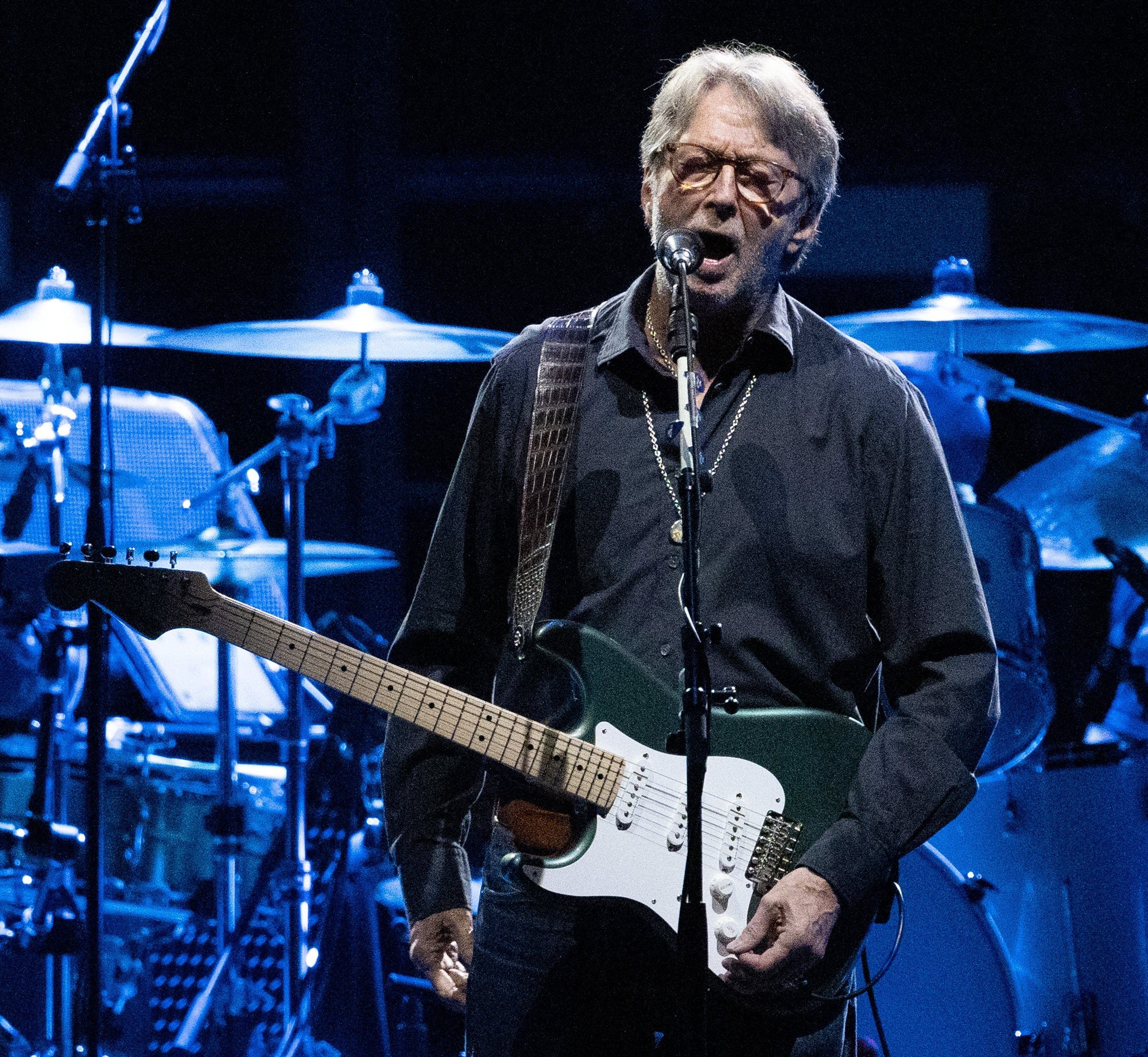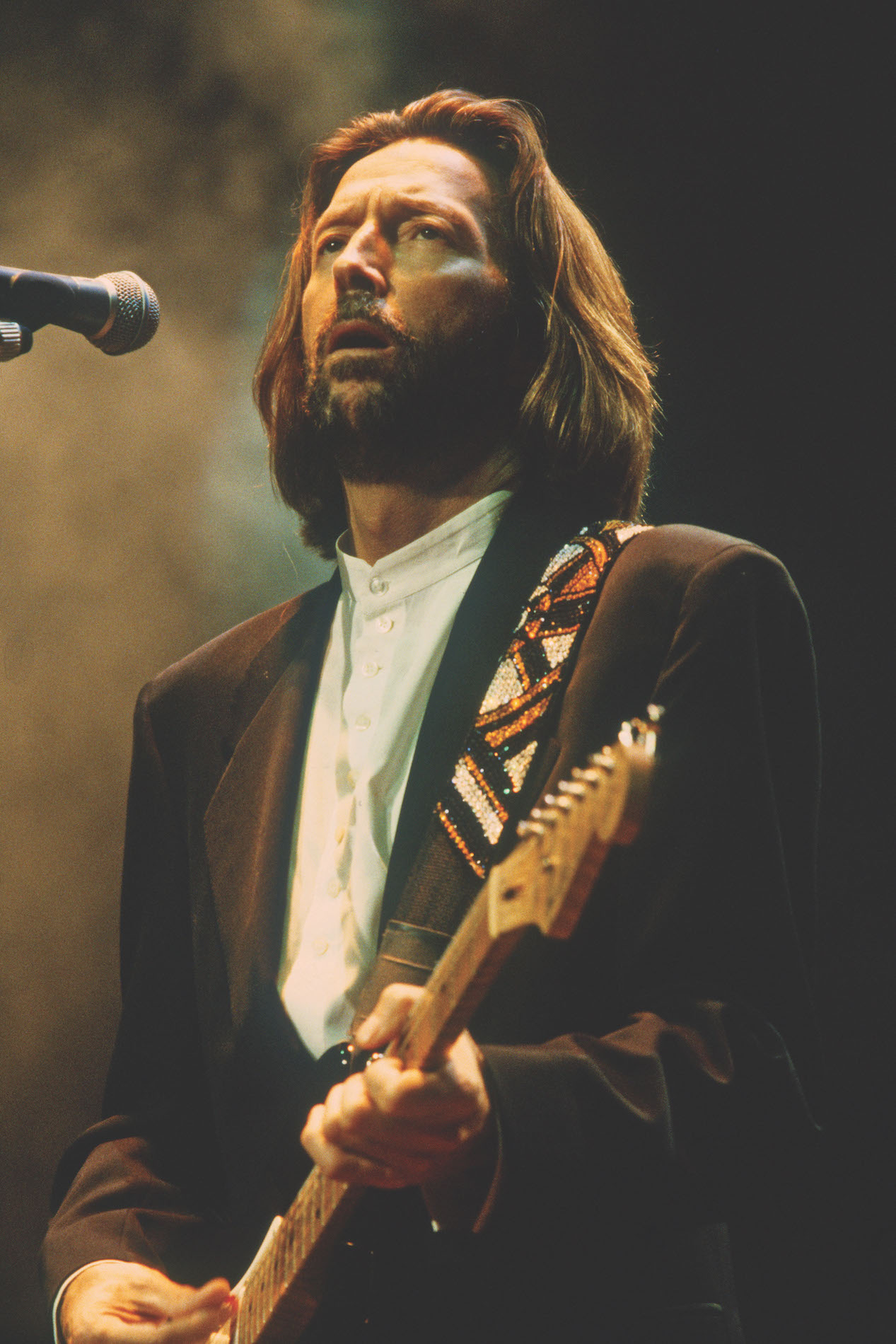Eric Clapton
Eric Clapton - The Story of a Guitar Icon
Eric Clapton, a name that echoes through the halls of music history, emerged onto the scene in the mid-1960s, a time when truly gifted musicians seemed to appear almost out of nowhere, ready to change the soundscape forever. He was, you know, a true phenomenon in that respect, someone who simply burst forth with a unique musical voice. His journey, as it turns out, was not one paved with formal lessons or traditional schooling; rather, it was a path forged by raw talent and an incredible dedication to the sounds he loved.
This remarkable artist, who would go on to be known by millions across the globe, basically learned his craft in a very personal way. He spent countless hours, day after day, just listening intently, picking apart the intricate pieces of recorded music with what people describe as an incredibly sensitive ear. This method of self-teaching, of really getting into the very essence of the notes, allowed him to develop a style that was, you know, deeply his own, something truly special and unmistakable.
Within a mere three years of this intense self-study, the sixteen-year-old Eric Clapton had, you could say, transformed himself into an absolute standout, a truly amazing guitarist who was, in some respects, already a legend on the streets. His unique approach to the instrument, built on pure instinct and relentless practice, set him apart, making him a figure of fascination and admiration among fellow musicians and listeners alike. It’s almost a story that seems too good to be true, yet it is, actually, the very beginning of his well-known rise.
Table of Contents
- Biography - Eric Clapton
- How Did Eric Clapton Become a Musical Force?
- What Was Eric Clapton's Impact on Blues Music?
- The Sound of Eric Clapton - What Made It Special?
- The Unplugged Phenomenon for Eric Clapton
- Eric Clapton's Journey - From Bands to Solo Success
- Where Is Eric Clapton Now?
Biography - Eric Clapton
Eric Patrick Clapton, a truly significant figure in the world of popular music, was born on March 30, 1945, in Ripley, Surrey, England. His full name, Eric Patrick Clapton, is one that has become synonymous with masterful guitar playing and a profound connection to the blues. He holds the honor of being a Commander of the Order of the British Empire, or CBE, which is, you know, a pretty big deal in terms of recognition for his contributions. He is, actually, a man who has worn many hats throughout his very long and distinguished career.
From his earliest days, Eric Clapton showed a remarkable aptitude for music, even without formal instruction, as we’ve touched on. He became, over time, not just a guitarist, but also a compelling singer, a thoughtful composer, and a versatile musician in every sense of the word. His work has spanned decades, influencing countless other artists and shaping the very sound of rock and blues music as we know it. He is, you might say, a foundational pillar of the sound.
His personal life, as is often the case with public figures, has seen its share of ups and downs, moments of great challenge, and periods of significant change. One particular time, around 1970, saw Eric Clapton step away from the public eye. This was, in a way, a very difficult period, as he was dealing with the heavy burden of drug addiction. It meant he had to leave the stage, to take a break from performing, so he could get the help he needed to heal. This decision, to prioritize his well-being, was, you know, a very brave one, showing a deep personal strength.
During this challenging time, there was, interestingly enough, a rather unique personal situation that unfolded. George Harrison, a close friend and fellow musician, was, at that point, deeply involved in spiritual studies and, at the same time, was starting to have doubts about his own marriage. It was in this somewhat complex personal landscape that George’s wife, Pattie Boyd, actually came to be a source of care and support for Eric Clapton. She simply came to be by his side, looking after him during his recovery. This particular period, stretching into 1976, was, in some respects, a very personal and impactful chapter in his life, one that highlights the human connections that shape us.
His life story, as you can see, is a rich tapestry of musical brilliance, personal struggle, and enduring influence. It’s a narrative that, really, speaks to the power of music to both reflect and transcend the human experience. His ongoing presence in music, still making sounds and performing, is a testament to his lasting passion and, you know, his incredible resilience. He is, to this day, a figure of great interest and respect for so many people who appreciate good music.
| Detail | Information |
|---|---|
| Full Name | Eric Patrick Clapton |
| Foreign Name | Eric Patrick Clapton |
| Title | CBE (Commander of the Order of the British Empire) |
| Gender | Male |
| Date of Birth | March 30, 1945 |
| Place of Birth | Surrey, United Kingdom |
| Nationality | British |
| Occupation | Musician, Singer, Composer, Guitarist |
How Did Eric Clapton Become a Musical Force?
So, how exactly did Eric Clapton, a young man from Surrey, become such a powerful presence in music? It really goes back to his very unusual, almost self-made, approach to learning. As we’ve discussed, he didn't sit in formal music classes or follow a strict curriculum. Instead, his education was, in a way, far more hands-on and deeply personal. He would, you know, spend hours and hours, every single day, just listening to records, trying to figure out every single note and chord. This process, often called "transcribing" or "ear training," was his main teacher, and it allowed him to absorb music in a very direct and intuitive way.
This intense dedication to listening and mimicking, to truly understanding the sound by breaking it down himself, made him, in some respects, a very unique kind of learner. He wasn't just playing notes; he was, actually, internalizing the very feel and spirit of the music he admired, especially the blues. This method, while unconventional, clearly worked wonders, because within a relatively short period, he was already gaining a reputation. People started to notice this young talent who could play with such feeling and skill, and he became, more or less, a local sensation.
By the time he was just sixteen, Eric Clapton was already being talked about as an exceptionally talented guitarist, someone who could really make the instrument sing. His ability to reproduce and then build upon the sounds he heard, all without formal guidance, was, you know, truly astounding. This raw, untamed talent, combined with his relentless practice, was the driving force behind his early rise. It was, you could say, the foundation upon which his entire musical journey was built, allowing him to connect with audiences on a very deep level right from the start. He was, literally, a natural at it.
His path was, in many ways, typical of the era's great musicians who, as people often say, seemed to appear out of nowhere, fully formed. But for Eric Clapton, it was the sheer force of his individual effort, his sensitive ear, and his passion for the sound that truly propelled him forward. He didn't just play the guitar; he, actually, communicated through it, and this ability, nurtured in those early years of self-discovery, is what made him, you know, such an enduring musical force. It's a pretty inspiring story, if you think about it, of pure talent finding its way.
What Was Eric Clapton's Impact on Blues Music?
So, what exactly did Eric Clapton do for blues music, and why is his contribution considered so important? Well, you know, many people would say that he was, quite simply, the very first person to be called a "guitar god." This title, while it has since been given to many other incredibly skilled guitarists, really originated with him. It speaks to the almost mythical status he achieved, a kind of reverence for his playing that was, actually, quite unprecedented at the time. He set a very high bar for what a guitarist could be, influencing countless others who came after him.
But beyond the personal accolades, Eric Clapton's truly significant contribution was, in some respects, far broader and more culturally impactful. He played a pivotal role in making blues music, a genre deeply rooted in African American traditions, accessible and, you know, widely accepted by white audiences. Before him, the blues, while certainly appreciated by many, didn't have the same kind of mainstream appeal in certain circles. He helped to bridge that gap, bringing the raw emotion and powerful storytelling of the blues to a much wider audience who might not have otherwise encountered it.
This wasn't just about playing blues songs; it was about, you know, truly embodying the spirit of the music and presenting it in a way that resonated with a new generation of listeners. He showed people that this music was not just historically important but also, actually, incredibly vibrant and relevant. In doing so, he didn't just popularize the blues; he also, very importantly, helped many Black musicians gain wider recognition for their foundational contributions to the genre. He often spoke about his influences and brought attention to the original artists, making sure their voices were heard by his growing fan base.
His work created a kind of pathway, allowing more people to appreciate the depth and authenticity of blues music. He acted, in a way, as a very powerful advocate, using his growing fame to shine a light on the artists and sounds that inspired him. This influence, this ability to connect different groups of people through music, is, you know, a truly lasting part of his legacy. He didn't just play the blues; he helped to expand its reach and ensure its continued vitality, which is, honestly, a pretty remarkable achievement for anyone in music.
The Sound of Eric Clapton - What Made It Special?
So, what was it about Eric Clapton's sound that made it so distinctive and, you know, instantly recognizable to so many people? It's often said that his signature tone was built on a foundation of surprising simplicity. While many guitarists might chase after elaborate setups with lots of pedals and different pieces of gear, Eric Clapton, more or less, achieved his iconic sound with what was, actually, a very minimal approach. It was almost just a guitar and an amplifier, working in perfect harmony, that created his unique voice.
This dedication to simplicity meant that every note he played, every bend of the string, really had to count. There was no hiding behind layers of effects; it was just the pure sound of his hands on the instrument, amplified through a very specific kind of gear. This focus on the raw essence of the sound allowed his incredible touch and feeling to come through in a very clear and powerful way. It’s a testament to his skill that he could get such a rich and expressive sound from such a straightforward setup, which is, you know, pretty impressive.
His sound was, in some respects, incredibly warm and full, yet also capable of cutting through a mix with a very clear presence. This balance, this ability to be both smooth and biting, was a hallmark of his playing. It’s a sound that has influenced countless guitarists and has become, actually, a kind of benchmark for what a great blues-rock guitar tone should be. He proved that you don't need a whole lot of complicated equipment to make truly impactful music; sometimes, less is, you know, genuinely more.
The purity of his sound, the way it conveyed so much emotion with relatively few elements, is what made it truly special. It was a sound that spoke directly to the listener, without any unnecessary distractions. This focus on the core elements of tone, and his mastery over them, is a significant part of why Eric Clapton's playing continues to resonate with so many people, even today. He truly understood how to make his instrument sing in a very personal and compelling way, which is, honestly, a rare gift.
Eric Clapton's Signature Gear
When we talk about Eric Clapton's sound, we simply have to mention his gear, particularly his Fender guitar. This instrument, as it turns out, is a very key component of his standard tone. What’s interesting is that his Fender guitar often comes with a specific kind of gain knob. This isn't just any knob; it’s one that, when combined with the gain from a particular type of amplifier, often a Tweed amplifier, creates that very specific, well-known sound that is, you know, so characteristic of Eric Clapton.
The combination of his Fender guitar and a Tweed amplifier is, in some respects, almost all he needed to create his signature sound. It’s a very simple setup, yet it yields a tone that is incredibly rich and expressive. This simplicity is, actually, part of its genius. He didn’t rely on a massive array of effects or a complicated chain of equipment. Instead, he mastered the nuances of these two core pieces, coaxing out every bit of character they had to offer. It’s a pretty powerful example of how focusing on the basics can lead to truly exceptional results.
There's also a very popular Fender Eric Clapton signature model Stratocaster that has become, you know, quite sought after by musicians. What makes this particular guitar stand out is its active circuitry. When you turn this circuit on, the guitar produces that unmistakable, iconic Eric Clapton sound, the one you hear on so many of his famous recordings. But, as a matter of fact, when you switch that active circuit off, the guitar functions just like a normal Stratocaster, giving you a very classic, versatile tone.
This feature, having both the signature Eric Clapton sound and a standard Stratocaster tone in one instrument, makes it, in some respects, a very comprehensive and appealing choice for guitarists. It’s almost like getting two guitars for the price of one, offering incredible flexibility for different musical styles and preferences. This signature model is, honestly, a testament to his lasting influence on guitar design and his desire to provide tools that help other musicians achieve great sounds. It’s a pretty smart design, if you ask me, offering so much in a single package.
The Unplugged Phenomenon for Eric Clapton
When people talk about Eric Clapton's career highlights, his "Unplugged" album and concert are, you know, almost always at the very top of the list. It’s widely considered to be one of his very best live performances ever, a moment where his artistry truly shone in a different light. This particular event, where he performed acoustically, without the usual electric guitar and loud amplifiers, captured something very raw and intimate about his music, allowing his voice and his nuanced guitar playing to take center stage in a way that was, actually, quite refreshing for many listeners.
The success of "Unplugged" was, in some respects, truly phenomenal. It marked the absolute peak of his record sales, selling an incredible number of copies around the globe. We're talking about more than 19 million records sold worldwide, which is, you know, a staggering figure for any artist. This commercial triumph showed just how much people connected with this stripped-down version of his music, proving that his songs and his playing could resonate just as powerfully without all the electric fanfare.
Beyond the impressive sales figures, "Unplugged" also brought Eric Clapton significant critical acclaim and, actually, a remarkable haul of awards. He received no fewer than six Grammy Awards for this project, which is, you know, a truly outstanding achievement. These prestigious awards included some of the biggest honors in music, such as Record of the Year. It was a moment of immense recognition for his talent and for the profound impact of this particular album, cementing its place as a landmark in his career and in music history itself.
The "Unplugged" concert and album proved that Eric Clapton's music had a timeless quality, that it could transcend different formats and still captivate audiences. It showcased his versatility as a musician and his ability to connect with listeners on a very deep, personal level through the sheer power of his songs and his guitar playing. It was, in a way, a very personal triumph, demonstrating his enduring appeal and his mastery of the acoustic instrument, which is, honestly, a pretty big deal for someone known for electric guitar work.
Eric Clapton's Journey - From Bands to Solo Success
Eric Patrick Clapton's career, as you might know, didn't just start with

Eric Clapton - Son, Songs & Bands

10 Best Eric Clapton Songs of All Time - Singersroom.com

Eric Clapton Releases Expanded Edition of Legendary Royal Albert Hall